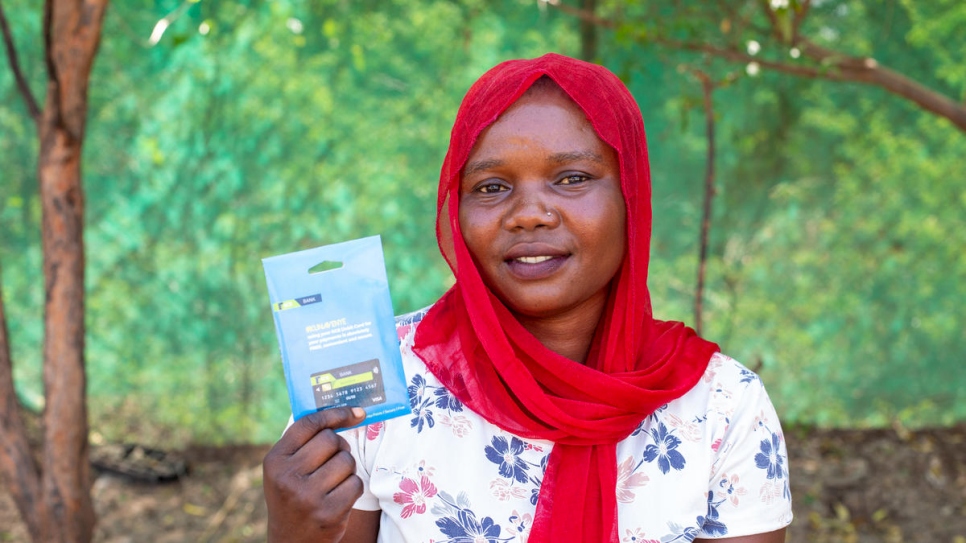Social Protection
UNHCR identifies with social protection as 'a set of policies and programmes aimed at preventing or protecting all people against poverty, vulnerability and social exclusion throughout their life-course, with emphasis on vulnerable groups' (Social Protection Interagency Coordination Board).
Various UNHCR Country Offices are working with government social protection programmes to help support the basic needs of the most vulnerable. We help people develop work and business skills, provide access to long-term jobs and support a range of health and workplace benefits that mitigate families' challenges. Well-functioning government social protection systems also host family and protection services under social welfare programmes and provide emergency assistance during disasters through shock-responsive social assistance top-ups, including for COVID-19 responses.
The ability to register refugees on government social registries is also opening up opportunities to other socio-economic government programmes. All of these areas of support helps to concretely realise the ambitions of the GCR whilst supporting progress on national protection and solutions strategies.
What does UNHCR do?
UNHCR works to support national protection and solutions strategies by:
- Helping governments and development actors open windows of inclusion in existing social protection programmes;
- Supporting scalable shock-responsive mechanisms that are inclusive of refugees during times of disaster (including pandemics), lean seasons or economic downturns;
- Progressively aligning UNHCR assistance to these programmes and setting up referral processes that prepare and accompany people, and;
- Ensuring coherent action by all actors across the humanitarian-development-peace nexus through a government-led transition action plan.
- Ensuring continued assistance where governments cannot fully meet the needs of forcibly displaced people.
UNHCR works in partnership with governments and other operational agencies across the HDP nexus, supporting the following actions where relevant and feasible:
Inclusion in government social protection systems – UNHCR analyses government policy and legal framework of national social protection systems, supports a feasibility analysis of inclusion in government programmes, helps to adjust project designs for additional protection and solutions dividends, supports data and analytics for social registry and targeting processes, facilitates transition action plans and referral processes (including meeting identification criteria) and helps to monitor the protection environment and the impacts of inclusion.
Inclusion in national health insurance schemes – As part of an overall approach to promote Universal Health Coverage, UNHCR works with the ILO to assess opportunities for inclusion of refugees in national social health protection schemes, assess their capacity to contribute to their health care costs through contributions to national schemes on par with nationals of similar socio-economic status, and catalyse support for additional financing for inclusion of refugees through donor and/or development agency support if domestic capacity is not possible.
Transitioning from cash-based interventions to social assistance – UNHCR works with regulators and Central Banks to enable refugees and others of concern access to mobile connections, bank accounts or mobile money wallets; sets up transitional safety nets for those who fall behind; aligns Cash-Based Interventions (CBI) with government social assistance programmes, and promotes the use of CBI and other forms of support to mitigate the impacts of shocks, maintain assets and scale up livelihoods and other forms of income opportunities to support self-reliance.
Further resources
Studies and Guidance
- Social Protection & the Inclusion of UNHCR Persons of Concern – East, Horn of Africa and the Great Lakes (2022)
- Emerging Lessons from World Bank Group Social Protection Investments in Refugee-hosting Areas (2021)
- Inclusion of Refugees in Government Social Protection Systems in Africa (2021)
- Leave No-one Behind: Promoting Effective Access of Refugees in Social Protection Systems in Post-Pandemic Europe. Integration Policy Brief I (2021)
- Social Protection Responses to COVID-19 For Forcibly Displaced Persons (2020)
- ILO-UNHCR Handbook on social health protection for refugees: Approaches, lessons learned and practical tools to assess coverage options (2020)
- Aligning Humanitarian Cash Assistance with National Social Safety Nets in Refugee Settings: Key Considerations and Learning (2019)
- Mapping of Social Safety Nets for Refugees - Opportunities and Challenges (2018)
Case Studies
- UNHCR-WFP Support to Refugee Integration in the Social Registry of Mauritania (2021)
- WBG-UNHCR Humanitarian Assistance and Social Safety Nets in Protracted Crises. A Case Study of Iraq (2020)
- CWG-UNHCR Integration of Venezuelan Refugees and Migrants in Brazil (2020)
- UNHCR Cameroon – Transitional Safety Net for Central African Refugees (2018)
- Health Insurance for Refugees in Iran
- ILO-UNHCR - Exploring public options of social health protection for refugees in West and Central Africa (2018)
Webinars
- Adapting social protection systems to contexts of forced displacement - GIZ ASPects Practice Exchange on Adaptive Social Protection Webinar Series, May 2022
- Social Protection for Ukrainian Refugees
- Emerging Research on Social Protection in Contexts of Fragility and Displacement – World Bank Fragility Forum 2022
- (Missed) Opportunities? COVID-19 as an accelerator or blocker in inclusion of forcibly displaced in linking social protection and humanitarian cash transfers
- ODI series Ep. 1 | Social protection provisions to refugees during the Covid-19 pandemic
- Emerging field practices to COVID-19 in refugee contexts

